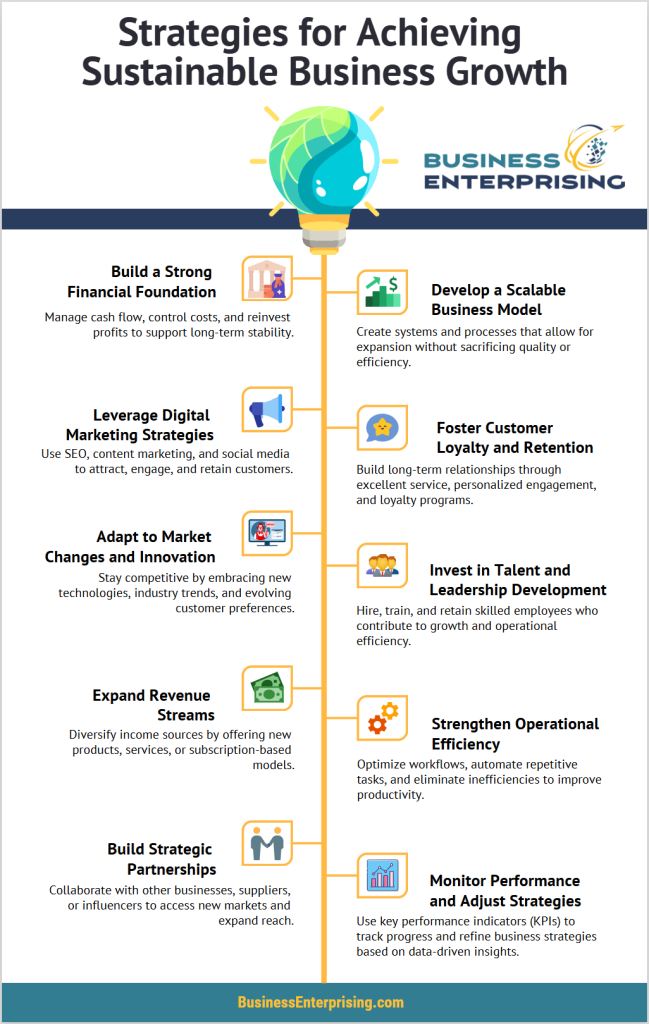
Each of these elements plays a crucial role in ensuring that your business not only grows but thrives in a competitive environment. By implementing these strategies thoughtfully, you can achieve sustainable business growth and secure a prosperous future for your company.
Building a Strong Financial Foundation
Building a strong financial foundation is essential for achieving sustainable business growth. Effective cash flow management ensures you can meet obligations and seize opportunities. Regularly monitor your cash inflows and outflows to maintain liquidity. Additionally, consider implementing efficient invoicing practices to expedite receivables. This proactive approach helps prevent cash shortages.
Controlling costs is another critical aspect. Regularly review your expenses to identify areas for reduction. For instance, negotiate better terms with suppliers or explore more cost-effective alternatives. By minimizing unnecessary expenditures, you can allocate resources more efficiently. However, be cautious not to compromise on quality or essential services.
Reinvesting profits strategically fuels long-term growth. Allocate earnings towards initiatives that enhance your business’s value. This might include investing in new technology, expanding your product line, or entering new markets. By reinvesting wisely, you position your company for sustained success. Therefore, develop a clear plan for profit allocation that aligns with your strategic goals.
By managing cash flow, controlling costs, and reinvesting profits, you establish a robust financial foundation. This approach not only stabilizes your operations but also supports future expansion. Consequently, you can navigate financial challenges more effectively and capitalize on growth opportunities. Remember, disciplined financial management is key to your business’s longevity and prosperity.
Developing a Scalable Business Model
Developing a scalable business model is essential for achieving sustainable business growth. Begin by creating efficient systems and processes that can handle increased demand without compromising quality. Standardizing operations allows for consistent output as your business expands. Additionally, consider automating repetitive tasks to improve efficiency and reduce human error.
Furthermore, ensure your business model is adaptable to changing market conditions. By building flexibility into your processes, you can respond swiftly to new opportunities or challenges. This adaptability not only supports growth but also helps maintain your competitive edge. Therefore, regularly review and update your strategies to align with current market trends.
Investing in technology is another key factor. Implementing scalable software solutions can streamline operations and support expansion. For instance, cloud-based platforms offer scalable resources that grow with your business needs. By leveraging technology, you can manage increased workloads efficiently.
Additionally, focus on building a strong team that can support your growth objectives. Hiring individuals with the right skills and mindset ensures that your business can scale effectively. Moreover, fostering a culture of continuous improvement encourages innovation and efficiency.
By establishing robust systems, embracing adaptability, leveraging technology, and building a capable team, you create a scalable business model. This foundation not only facilitates growth but also ensures that your business can thrive in a dynamic market environment.
Leveraging Digital Marketing Strategies
Leveraging digital marketing strategies is essential for attracting and retaining customers. By implementing effective SEO techniques, you can improve your website’s visibility on search engines. This increased visibility drives organic traffic to your site. Additionally, conducting thorough keyword research allows you to understand what your target audience is searching for. By incorporating these keywords naturally into your content, you can enhance your site’s relevance and ranking. This approach not only attracts potential customers but also establishes your brand as an authority in your industry.
Content marketing plays a pivotal role in engaging your audience. By creating valuable and relevant content, you can address the needs and interests of your customers. This content can take various forms, such as blog posts, videos, or infographics. By providing informative and entertaining content, you build trust with your audience. This trust encourages customer loyalty and repeat business. Moreover, high-quality content is more likely to be shared, expanding your reach. Therefore, a well-planned content strategy is crucial for achieving sustainable business growth.
Social media platforms offer a dynamic avenue to connect with your customers. By maintaining an active presence on platforms like Facebook, Instagram, or LinkedIn, you can engage with your audience in real-time. Sharing updates, responding to comments, and participating in discussions humanizes your brand. This engagement fosters a sense of community and belonging among your customers. Additionally, social media allows for targeted advertising, enabling you to reach specific demographics effectively. By analyzing engagement metrics, you can refine your strategies to better meet your audience’s preferences. This adaptability ensures that your marketing efforts remain effective and relevant.
Fostering Customer Loyalty and Retention
Building long-term relationships with your customers is essential for achieving sustainable business growth. Providing excellent service lays the foundation for these relationships. By addressing customer needs promptly and effectively, you demonstrate that you value their business. This attentiveness encourages customers to return. Additionally, satisfied customers are more likely to recommend your services to others.
Personalized engagement further strengthens customer bonds. By tailoring your interactions to individual preferences, you make customers feel valued. For instance, addressing customers by name and remembering their past purchases can enhance their experience. This personal touch fosters loyalty. Moreover, personalized communication can lead to increased customer satisfaction.
Implementing loyalty programs rewards repeat customers and incentivizes continued patronage. Offering exclusive deals or discounts to loyal customers shows appreciation for their support. These programs not only retain existing customers but also attract new ones. Therefore, a well-designed loyalty program can be a powerful tool for customer retention.
By focusing on excellent service, personalized engagement, and rewarding loyalty, you can build lasting customer relationships. These strategies not only enhance customer satisfaction but also contribute to the long-term success of your business. Consequently, investing in customer loyalty initiatives is a prudent approach to achieving sustainable business growth.
Adapting to Market Changes and Innovation
Adapting to market changes and embracing innovation are essential for achieving sustainable business growth. By staying attuned to emerging technologies and evolving customer preferences, you can maintain a competitive edge. However, this requires a proactive approach to monitoring industry trends. Additionally, fostering a culture that encourages innovation within your organization is crucial.
To begin, regularly assess market developments to identify opportunities and threats. This involves analyzing competitors and understanding shifts in consumer behavior. Therefore, implementing agile methodologies can enhance your ability to respond swiftly. Moreover, engaging with customers through feedback mechanisms provides valuable insights. Consequently, you can tailor your products or services to meet their changing needs.
Furthermore, investing in new technologies can streamline operations and open new revenue streams. For instance, adopting digital tools can improve efficiency. Similarly, exploring automation can reduce costs. However, it’s important to balance technological adoption with human oversight. This ensures that innovation aligns with your company’s values and customer expectations.
In addition, fostering a culture of continuous improvement encourages employees to contribute ideas. By promoting collaboration and open communication, you can harness diverse perspectives. Therefore, providing training and resources supports skill development. As a result, your team becomes more adept at navigating market changes.
Ultimately, embracing change and fostering innovation positions your business for long-term success. By remaining flexible and forward-thinking, you can adapt to market fluctuations. Consequently, this approach ensures that your company not only survives but thrives in a competitive landscape.
Investing in Talent and Leadership Development
Investing in talent and leadership development is essential for achieving sustainable business growth. By hiring skilled employees, you lay a strong foundation for your company’s success. Additionally, providing ongoing training ensures your team remains competent and adaptable. This adaptability is crucial in today’s evolving market.
Moreover, retaining top talent reduces turnover costs and maintains organizational stability. When employees see opportunities for growth, they are more likely to stay. This commitment fosters a positive work environment. Furthermore, effective leadership development prepares individuals to take on greater responsibilities. This preparation is vital for seamless succession planning.
Therefore, by focusing on talent acquisition, continuous training, and leadership cultivation, you position your company for long-term prosperity. These efforts not only enhance performance but also drive innovation. Ultimately, a well-developed team is a cornerstone of sustained business success.
Conclusion
Building a strong financial foundation is essential for achieving sustainable business growth. Effective cash flow management ensures you can meet obligations and seize opportunities. Monitoring income and expenses allows you to identify areas for improvement. Additionally, controlling costs helps maintain profitability. Regularly reviewing expenses and seeking cost-effective alternatives can lead to significant savings.
Reinvesting profits into the business fuels expansion and innovation. Allocating funds to research, development, and employee training enhances competitiveness. Therefore, a disciplined financial strategy supports long-term stability and growth.



